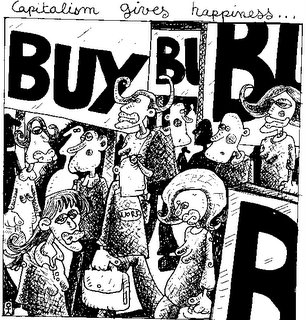Beyond Capitalism - Beyond Liberation - Yet Present, not Beyond

Read this article, (by clicking the link) but only if you have 20-30 minutes to digest a critique of Capitalism, with incidental critiques of Liberation Theology scattered throughout. The question at stake is this: Is the greed that is so systemic to what motivates capitalist machinery good because of the results it produces, or because it's the least evil option among evil options? Or is it good at all?
The article is thought provoking because it invites us to consider the ethics of the Kingdom as that which we order our lives by as followers of Christ. Provoking article? Yes. Fully compelling? No. Here's why: In order to live the economic ethic of the kingdom 24/7 (as the author seems to suggest) all of us would need to quit our jobs and move into communities where the clothes we wear are handmade, and the food we eat is grown locally and organically. And we won't be driving anywhere - nor will we fly - nor will we use the internet to do things like I'm doing right now. All these ammenities are the by-products of capitalism. And though capitalism is admittedly flawed, the critics nevertheless continue to consume the riches of the very system they critique, inviting all of us to receive a kingdom economic ethic as the higher ground. But the invitation comes across as economic utopianism.
Of course we need a kingdom economic ethic. But how much? Are we willing to become isolationist so as to remain 'untainted' by the world. Such thinking seems to me to forfeit our calling to be salt and light in any meaningful way (at least among capitalists). No; I think the better alternative is to commit to working out our kingdom economic ethic while at the same time acknowledging that I live in the midst of an economic system. The fact that I live in it means I'm called to do just that: live in it. I'll acknowledge the weaknesses and work to overcome them (for example: how can democratic capitalism work to overcome the reality of so many millions without health care, and the reality that homelessness and families living in poverty continues to be on the rise? - The answer lies, in part at least, with an acknowledgement that capitalism is flawed in its thinking that self-interest will always result in betterment for all people - it simply isn't happening right now - better for some, and better relative to Darfur for most - but not better in the sense of enobling, empowering, or satisfying. Thus we need to legislate in ways that mitigate unbridled greed. We could speak so much more of this... but alas no time). But though I'll see the weaknesses, I'll still live in the system because the system is both where I live, and is itself not so wholly evil as to be of no value. Consider that for all its flaws, those living under some measure of capitalism still enjoy greater access to health care, greater life expectancy, and greater freedom to use their resources, be they limited or abundant, for God's kingdom purposes, than people living under so many forms of totalitarianism . But the loud question we must be asking and aren't is this: What are we doing with all this wealth that we have? As soon as we begin to ask this question, we begin to question both our personal lives and the liabilities of capitalism itself. And both need to be critiqued!
All this is to say that capitalism isn't the kingdom of God, and we're to seek the kingdom first. But we're also to acknowedge that we all are called to take up residence somewhere, in time and space, in this fallen world. And it is there that I need to live - feed my family, practice hospitality, work to improve the well being of those around me. Deconstructing capitalism by enjoining us to live 'in the kingdom of God' sounds nice, but you still need to drive to work, or ride a bike, or take the bus. And if you do... you're in the system. Be SALT and LIGHT right these in the midst of the flawed system, recognizing that the system, for all its flaws, is where we live.


0 Comments:
Post a Comment
<< Home